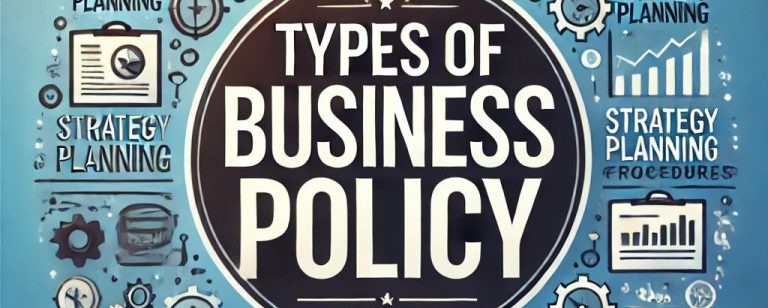The types of business policy are fundamental to the smooth operation of any organization. Business policies are a broad framework that guides decisions, actions, and strategies about how to achieve organizational objectives. The policies vary, depending on their purpose, scope, and level of implementation. Knowing the types of business policies, their objective, and their importance is, therefore, crucial in preparing a structured and efficient system of work. From strategy policies that shape long-range plans to operational policies for streamlining daily tasks, each type plays a vital role in guiding decisions and actions.
What is Business Policy?
A business policy is a set of guidelines and principles designed to influence and direct decisions and actions within an organization. These policies ensure consistency in operations and help employees understand the company’s expectations and objectives.
Characteristics of Business Policy
Business policies are essential for guiding an organization’s actions and decisions. They provide a structured framework that helps employees stay aligned with the company’s goals and adapt to challenges. Well-defined policies ensure consistency, fairness, and efficiency across all levels of the organization.
- Framework for Decision-Making: Policies provide a clear structure for making consistent and informed decisions, helping employees address challenges effectively.
- Strategic Focus: Policies align with the company’s mission and long-term goals, ensuring every action supports the organization’s vision.
- Dynamic Nature: Policies are flexible and can be updated to adapt to changing environments, market demands, or regulations.
- Universal Applicability: Policies apply to all departments and levels, ensuring fairness, consistency, and smooth operations throughout the organization.
The objective of Business Policy
The objectives of business policies define their purpose and role within an organization. They serve as tools to ensure alignment between individual actions and organizational goals.
- Consistency in Operations: Policies provide a standardized approach to decision-making, eliminating confusion and ensuring uniformity across departments. They help streamline processes and improve overall efficiency in day-to-day activities.
- Strategic Alignment: Policies align daily operations with the company’s strategic goals, ensuring all employees work towards a common objective. This connection between tasks and goals helps the organization achieve long-term success.
- Risk Management: Policies help identify and reduce risks by setting clear guidelines, and protecting the organization from legal and operational challenges. They also provide a safety net for handling unexpected issues effectively.
- Enhanced Communication: Policies act as a reference point for employees and stakeholders, reducing misunderstandings and promoting transparency. They ensure everyone has access to the same information, fostering better collaboration.
- Employee Empowerment: Policies enable employees to make decisions within predefined boundaries, encouraging accountability and boosting morale. Clear guidelines give employees the confidence to act independently while staying aligned with company expectations.
Types of Business Policy
The types of business policy vary based on their function, level of implementation, and purpose. Each type plays a distinct role in ensuring organizational success. By categorizing and implementing various types of business policies, organizations can create a balanced and effective work environment.
Strategic Policies
Strategic policies focus on the organization’s long-term goals and overall direction. These policies guide major decisions that shape the future of the company.
- Examples: Expansion plans, strategies for entering new markets, and investments in research and development (R&D).
- Purpose: Strategic policies help top management make critical decisions and adapt to changes in the external market. They ensure the organization stays competitive and aligned with its vision.
Tactical Policies
Tactical policies break down strategic policies into specific actions that middle management can implement. These policies focus on medium-term objectives and help connect the organization’s broad goals to everyday activities.
- Examples: Planning marketing campaigns, launching new products, and organizing workforce requirements.
- Purpose: Tactical policies bridge the gap between strategic and operational levels. They provide clear instructions for achieving the company’s medium-term goals effectively.
Operational Policies
Operational policies focus on routine activities and day-to-day operations. These policies ensure that all employees follow a standardized approach to complete their tasks efficiently.
- Examples: Rules for employee attendance, customer service guidelines, and policies for purchasing materials.
- Purpose: Operational policies maintain consistency in daily work processes. They help streamline workflows and improve overall efficiency.
Financial Policies
Financial policies manage the organization’s financial resources, including budgeting, investments, and expenses. These policies ensure that funds are used wisely and transparently.
- Examples: Policies for distributing dividends, implementing cost-cutting measures, and allocating capital for projects.
- Purpose: Financial policies maintain the company’s financial stability and optimize resource allocation to maximize profits and returns.
HR Policies
Human resource (HR) policies focus on managing employees and creating a positive work culture. These policies ensure fair treatment for all employees and compliance with labor laws.
- Examples: Recruitment guidelines, employee benefits packages, and workplace ethics codes.
- Purpose: HR policies promote employee satisfaction and productivity. They also help build a respectful and inclusive workplace.
IT and Data Policies
IT and data policies govern how technology and sensitive information are used within the organization. These policies protect against data breaches and ensure proper use of technological resources.
- Examples: Cybersecurity protocols, data privacy rules, and software usage policies.
- Purpose: IT and data policies safeguard sensitive information and ensure that technology is used efficiently and responsibly.
Importance of Business Policy
The importance of business policy lies in its ability to streamline operations, foster a unified culture, and guide organizational growth. By recognizing the significance of business policies, companies can build a strong foundation for sustainable growth.
- Decision-Making Framework: Provides a reference for making consistent and informed decisions, reducing the chances of errors and conflicts in operations. It ensures decisions are made fairly and align with organizational goals.
- Facilitates Strategic Planning: Aligns organizational activities with long-term goals, ensuring resources are utilized effectively. It helps the company stay focused and adapt to changing market conditions.
- Ensures Compliance: Helps organizations adhere to legal, ethical, and industry standards, protecting the company from risks and liabilities. It builds trust with stakeholders and ensures smooth regulatory checks.
- Promotes Efficiency: Streamlines workflows by eliminating ambiguities and increasing productivity with clear expectations and roles. It reduces delays and helps teams work together seamlessly.
- Builds Organizational Culture: Reinforces the company’s values, mission, and vision while encouraging collaboration and mutual respect among employees. It fosters a positive work environment and strengthens team relationships.
Business Policy FAQs
What are the types of business policy?
The types include strategic, tactical, operational, financial, HR, and IT policies.
Why are business policies important?
They provide a framework for decision-making, ensure compliance, and promote efficiency.
What is the objective of business policy?
The objective is to align actions with organizational goals, standardize operations, and manage risks.
How often should business policies be updated?
Regularly review policies to ensure they remain relevant to industry trends and organizational needs.
Where can I find more details on business policies?
Download our comprehensive classification of business policy PDF for detailed insights.


